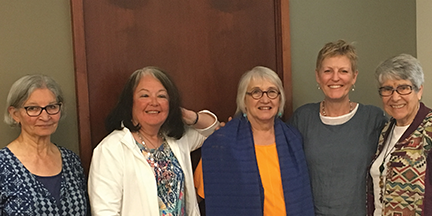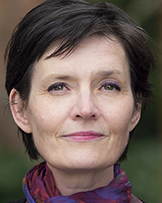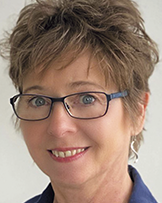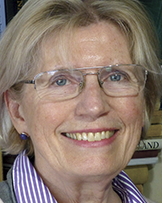Equity award
 Left to right: Shree Mulay, Audrey Kobayashi, Marjorie Griffin-Cohen, Susan Prentice and Louise Forsyth. Missing: Glenis Joyce, the late Wendy Robbins and the late Michèle Olivier.
Left to right: Shree Mulay, Audrey Kobayashi, Marjorie Griffin-Cohen, Susan Prentice and Louise Forsyth. Missing: Glenis Joyce, the late Wendy Robbins and the late Michèle Olivier.
A group of eight women were recognized for their collective effort to challenge discrimination in the Canada Research Chairs (CRC) program. These women are Marjorie Griffin-Cohen (Simon Fraser University), Louise Forsyth (University of Saskatchewan), Glenis Joyce (University of Saskatchewan) Audrey Kobayashi (Queen’s University) Shree Mulay, (Memorial University), Susan Prentice (University of Manitoba), the late Wendy Robbins (University of New Brunswick) and the late Michèle Olivier (University of Ottawa).
Canada’s research community owes much to these women who came forward 18 years ago to challenge systemic bias in the CRC program and the six remaining who persevered in holding the program to account with an appeal in 2017. This action resulted in important changes in the program and more broadly within institutions.
Geoff Rayner-Canham receives Lee Lorch Award
 Photo credit: Marelene Rayner-Canham
Photo credit: Marelene Rayner-Canham
The Lee Lorch Award went to Geoff Rayner-Canham, Honorary Research Professor and Professor Emeritus with the Department of Chemistry and Environmental Science at Memorial University. An outstanding scholar, dedicated educator, and a source of inspiration to the wider community, Rayner-Canham has received many awards for excellence in teaching, research and science promotion. For over 40 years, he has worked tirelessly to recruit students, and especially women, to chemistry. He has raised public awareness of science across Newfoundland and Labrador, developing an outreach program for remote Inuit, Innu, and Mi’kmaq communities. Rayner-Canham was also actively involved with the Memorial University of Newfoundland Faculty Association and with his professional association, holding various roles over his career.
Helga Hallgrímsdóttir receives Donald C. Savage Award
 Photo credit: University of Victoria photo services
Photo credit: University of Victoria photo services
Dr. Helga Hallgrímsdóttir, past President of the University of Victoria Faculty Association, was awarded the Donald C. Savage Award for excellence in bargaining. Helga’s focus on involving association members has made the Union more democratic and successful in making gains for members.
Geneviève Boulet receives Sarah Shorten Award
 Geneviève Boulet, an Associate Professor of Educational Mathematics at Mount Saint Vincent University, has been presented with the Sarah Shorten Award in recognizing of contributions to the promotion of the advancement of women in Canadian universities and colleges. Boulet has held various roles with the Mount Saint Vincent University Faculty Association (MSVUFA), including as the first woman Chief Negotiator. She has provided an inspiration to challenge patriarchal systemic oppression in higher education through her leadership in bargaining within a feminist framework and from her educational work which aims to advance women and girls in the field of mathematics. As Chief Negotiator, Boulet supported MSVUFA in a feminist review of its collective agreement, leading to many gains of importance to equity-seeking members, including improvements to leaves for domestic violence, compassionate care and family caregiving.
Geneviève Boulet, an Associate Professor of Educational Mathematics at Mount Saint Vincent University, has been presented with the Sarah Shorten Award in recognizing of contributions to the promotion of the advancement of women in Canadian universities and colleges. Boulet has held various roles with the Mount Saint Vincent University Faculty Association (MSVUFA), including as the first woman Chief Negotiator. She has provided an inspiration to challenge patriarchal systemic oppression in higher education through her leadership in bargaining within a feminist framework and from her educational work which aims to advance women and girls in the field of mathematics. As Chief Negotiator, Boulet supported MSVUFA in a feminist review of its collective agreement, leading to many gains of importance to equity-seeking members, including improvements to leaves for domestic violence, compassionate care and family caregiving.
Harriet Sonne De Torrens receives Academic Librarians' & Archivists’ Distinguished Service Award
 Photo credit: M. Torrens
Photo credit: M. Torrens
Harriet Sonne De Torrens began organizing and advocating for academic librarians at the University of Toronto in 2007 through her service on the faculty association’s Librarians Committee and has since held numerous positions with the Association. Her career exemplifies persistent activism and advocacy, contributing to the advancement of the status and working conditions of academic librarians at the local, regional, and national level. She has authored articles and chapters on the subjects of academic freedom for academic librarians, academic status, professional autonomy, the importance of engaging in scholarly activities, the history of academic librarian activism at the University of Toronto, and why advocacy is so critical.